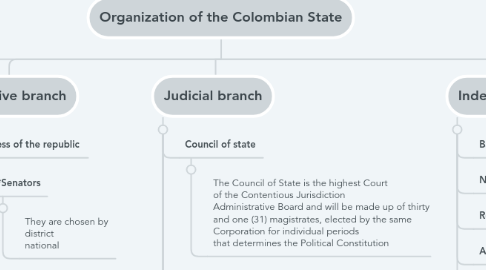
1. Executive branch
1.1. President
1.1.1. Elected by 50%+1 vote
1.1.2. *Ministries
1.1.2.1. The Constitution empowers the president of the Republic to present a shortlist of candidates before the Senate who has the power to choose any of they. Prior to appearance, the Senate shall appoint the minister by a vote of 2/3 parts of the members of the Senate present.
1.1.3. *Mayors
1.1.3.1. popular vote
1.1.4. *Governorates
1.1.4.1. The same day of the mayors
1.2. Vice president
1.2.1. Elected on the same day of the election presidential, is that of his formula
2. Legislative branch
2.1. Congress of the republic
2.1.1. *Senators
2.1.1.1. They are chosen by district national
2.1.2. *House of Representatives
2.1.2.1. They are elected by vote popular since the 2010 elections
3. Judicial branch
3.1. Council of state
3.1.1. The Council of State is the highest Court of the Contentious Jurisdiction Administrative Board and will be made up of thirty and one (31) magistrates, elected by the same Corporation for individual periods that determines the Political Constitution
3.2. Constitutional court
3.2.1. The magistrates of the Constitutional Court will be elected by the Senate Republic for individual periods of eight years, of short lists that presented by the President of the Republic, the Supreme Court of Justice and the Council of State. The judges of the Court Constitutional may not be reelected.
3.3. Supreme Court of Justice
3.3.1. The Supreme Court of Justice is made up of 23 magistrates, elected by the same List Corporation made up of the Superior Council of the Judiciary, for individual terms of eight years.
3.4. Superior Council of the Judiciary
3.4.1. Administrative room composed of six magistrates, of whom one is elected by the Constitutional Court, two by the Supreme Court of Justice and three for the Council of State. Jurisdictional Chamber Disciplinary composed of seven magistrates elected by the Congress of shortlists sent by the government.
3.5. General Prosecutor of the Nation
3.5.1. Elected by the Supreme Court of Justice for a period of four years re-eligible from a shortlist sent by the Republic President.
4. Independent bodies
4.1. Bank of the Republic
4.2. National Civil Service Commission
4.3. Regional Autonomous Corporations
4.4. Autonomous university entities
4.5. National television authority
5. Control entities
5.1. National Attorney General's Office
5.1.1. The designation of the Attorney General is carried out by voting in the Senate of the Republic, the candidates are presented by the President of the Republic, the Supreme Court of Justice and the Council of State.
5.2. Comptroller General of the nation
5.2.1. It is appointed by the Permanent Commission of the Congress of the Republic, at the proposal of the Executive Power, for a period of seven (07) years; is the senior official rank of the System, and enjoys the same rights, prerogatives and privileges belonging to a Minister of State.
5.3. Ombudsman
5.3.1. The Ombudsman is elected every four years by the House of Representatives from a short list sent by the President of the Republic
